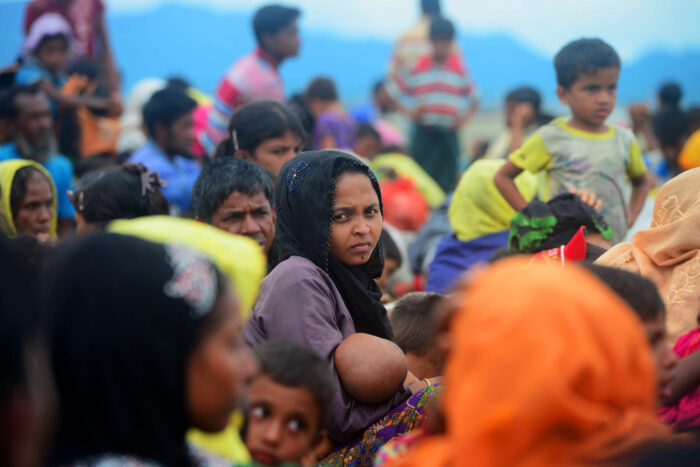By Fen Osler Hampson, Saifullah Muhammad and John Packer
Fen Osler Hampson is President of the World Refugee & Migration Council, Saifullah Muhammad is a Rohingya and Cofounder of the Rohingya Centre of Canada, and John Packer is a Professor of Law at the University of Ottawa.
This article was originally published in The Hill Times.
Crammed inside bamboo and tarpaulin huts perched precariously atop mud hills along Bangladesh’s southern border with Myanmar, a million Rohingya refugees wonder whether the world has forgotten them.
The fifth anniversary of their 25 August 2017 mass exodus in the face of brutal attacks by Myanmar’s Armed Forces is approaching. Bangladesh allowed them entry and, with the international community’s help, has given them humanitarian assistance.
But there has been no meaningful progress for their return home. Indeed, despite fruitless attempts by China to broker an agreement between Bangladesh and Myanmar for repatriation, the situation has only worsened.
Civil war between the Arakan Army, comprising Rakhine Buddhists, and the Tatmadaw has precluded voluntary repatriation in conditions of safety and dignity. Since the 1 February 2021 coup, Myanmar’s de facto ruler General Min Aung Hlaing has made clear that the junta has no intention of allowing Rohingya to return to their homeland. Whatever his intent, the situation in Myanmar is simply not safe. It has deteriorated in almost every respect and been exacerbated by the COVID pandemic.
Rohingya prospects have never been good. Global refugee situations tend to become protracted, with many living in camp-like situations for decades. The experience of the Rohingya is no different. The 2017 exodus was their fifth, with some 85 per cent of Rohingya having been forced to flee their homeland over the last 44 years.
Whether in Bangladeshi camps or dispersed in a handful of other countries, Rohingya are subjected to constraints as refugees resulting in individual and collective suffering. In such context, hopelessness is a significant challenge. The failure to educate the population exacerbates a range of attendant problems, including for basic survival, income generation and cultural maintenance. Radicalisation is also a real threat. Whatever the longer term, it is vital to deliver educational services and assist Rohingya to recover and support the next generation of social capital and leaders.
Since 2017, Canada has been a leader in providing humanitarian assistance, mainly delivered through international organisations and direct assistance to Bangladesh. Canada has also been vocal in support of efforts for criminal accountability. However, the needs and perspectives of Rohingya youth are insufficiently addressed. Unlike other major refugee situations like Syria, Afghanistan, or Ukraine, Canada has taken few Rohingya (less than 1,000 Rohingya refugees have been admitted to Canada).
For some time, arguments have been made against the resettlement of Rohingya, with key actors preferring repatriation, including many Rohingya themselves. Yet five years on, with no apparent light at the end of the tunnel, better interim arrangements are required.
The US Government and others are now positively disposed to accept Rohingya refugees; this will come none too soon especially for desperate Rohingya youth who have no other opportunities.
There is also a role for Canada to play in keeping with our tradition and means of assistance. With modest effort, Canada can help provide relief and help educate a new generation of Rohingya through educational services delivered in Canada. A carefully designed programme and even modest numbers would be meaningful. Some dedicated assistance is likely required to help younger Rohingya meet high school equivalencies and language proficiency before continuing to college and university education in various fields. But in 4-5 years, a new generation would be trained. Indeed, if that had begun in 2017, they would already be graduates.
Canada should seize this window of opportunity and pro-actively offer resettlement accompanied by educational assistance. Such a Rohingya initiative could provide a model for others with similar needs.
While Foreign Affairs Minister Mélanie Joly has indicated her intention to appoint a special envoy, it is unclear what such an appointment can achieve in the current context. Indeed, the 17 recommendations made in spring 2018 by the Prime Minister’s then Special Envoy, Bob Rae, including number six calling for Canada to welcome refugees, have largely yet to be fulfilled.
In terms of making appointments, better than a special envoy would be to establish a Rohingya Working Group, as urged by Ambassador Rae (his recommendation 16), that would report to Parliament and the Canadian public. Direct support to Canadian Rohingya groups who are the best placed to engage with Rohingya refugees in Canada and abroad is also long overdue as is support for resettlement and education of Rohingya youth.
Image: Rohingya refugees cross into the mainland after arriving in Bangladesh on September 10, 2017 in Shah Porir Dwip Bangladesh. Credit: shutterstock/Mamunur Rashid.

